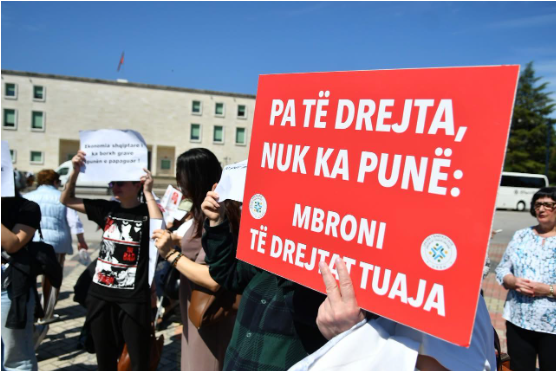While Albania officially celebrates International Workers’ Day with improved economic indicators, the lived reality for thousands of workers across the country tells a different story, one marred by informal employment, unsafe conditions, and a widening gap between policy and practice. The latest data from Albania’s Institute of Statistics (INSTAT) reveals a declining unemployment rate, 8.8% in 2024, compared to 11.8% in 2020, and a rising average monthly wage, now at 83,401 ALL, up from 59,565 ALL just three years earlier.
But beneath these numbers lies a labour market fractured by structural challenges. According to INSTAT’s own 2023 labour force survey, nearly half of all employed Albanians (48.6%) earned less than 60,000 ALL per month, a figure that sits well below the reported average. The data suggest that while macroeconomic indicators have improved, wage growth is unevenly distributed—and many households are feeling left behind.
The Paradox: Labour Shortage Amid Mass Unemployment
Albania’s labour market is caught in a paradox: thousands of jobs remain unfilled, even as tens of thousands of citizens remain unemployed or disengaged. As of early 2025, there are 6,300 job vacancies listed on official employment platforms, while over 68,000 individuals are registered as jobseekers with national employment agencies. The discrepancy, according to employment expert Erald Pashaj, stems not from a lack of job supply or demand, but from a mismatch in expectations and conditions.
“We have jobs, but not careers. People don’t leave the country just for higher pay; they leave because they don’t see a dignified future here,” Pashaj told [Publication Name]. “The labour market doesn’t reward education, experience, or commitment.”
This sentiment is echoed by many young Albanians, who view the domestic job market as a last resort. Migration remains a dominant theme. For thousands, Germany, the UK, or Italy represent not just opportunity—but escape.
Informality: Albania`s Enduring Labour Disease
One of the most persistent, and least addressed, problems is informality. The 2023 annual report from the Albanian Confederation of Trade Unions (KSSH) estimated that more than 143,000 employees are officially reported as receiving only the minimum wage through banks, while in reality they are paid additional amounts in cash—off the books.
This widespread underreporting allows employers to dodge social security contributions and taxes, leaving workers with no pension benefits, no health insurance, and no protection from exploitation. Despite increased digitization in payroll reporting, enforcement remains weak, and inspections are infrequent. Thetrue cost of this informal economy is borne not just by workers, but by the state itself, through shrinking pension funds and diminished public service revenues.
Unsafe by Design: Deaths on the Job
Perhaps the most tragic consequence of systemic neglect is the rising toll of workplace deaths. In the first months of 2024 alone, 33 workers lost their lives on the job, compared to 30 in all of 2023. Most of these fatalities occurred in the construction, mining, and manufacturing sectors.
The government`s proposed National Strategy on Occupational Safety and Health (2024–2030) includes several ambitious reforms: improving workplace inspections, increasing employer accountability, and strengthening worker education. But critics argue that the strategy lacks the budget, political will, and independent oversight necessary for real impact.
“We’ve seen strategies before. What we need is enforcement,” said a union representative attending the May 1st protest in Tirana. “There are more plans than there are inspectors.”
A Divided May 1st: Between Protest and Indifference
This year’s May 1st presented a divided national scene. In Tirana, unions and youth activists took to the streets, demanding wage increases and safer working conditions. Banners read: “Prices like Europe, Wages like Africa,” and “You Work, They Profit.”
In contrast, coastal cities like Durrës saw packed beaches and little sign of public unrest. The government-backed “Shqipëria Bëhet” initiative, ostensibly a celebration of national progress, was criticized for blurring the line between civic engagement and political marketing.
“This was supposed to be a protest, not a campaign rally,” said one youth participant who left the gathering early in frustration.
Albania`s labour issues are not just economic, they are political and social. Despite a growing economy, the country continues to lose its young workforce to emigration, while those who remain are often employed informally, underpaid, or unprotected. Analysts warn that unless deep structural reforms are undertaken, reforms that prioritize worker rights, safe conditions, and collective bargaining, Albania risks deepening its demographic crisis and further eroding public trust.
The Workers Message: Enough Silence
At the heart of this year`s protests was a message of unity. Over 500 union members, students, and workers gathered to demand:
- Stronger unions and collective bargaining in the private sector;
- Real measures to tackle informality;
- Serious investment in workplace safety;
- Dignified pensions and fair youth employment strategies;
- As one protestor shouted into a megaphone:
“Without workers, there is not democracy. Without rights, there is no dignity.“
On a day that was meant to celebrate the strength and contribution of workers, too many Albanians are still fighting just to be seen.
Written by our correspondent A.T.



